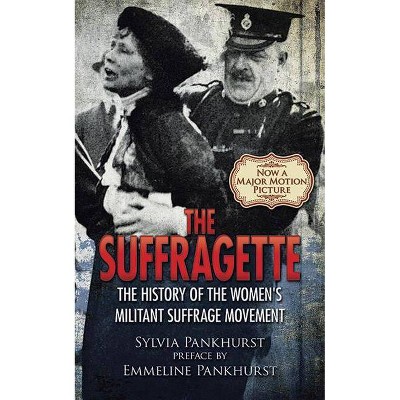The Future of Feminism - by Sylvia Walby (Paperback)

Similar Products
Products of same category from the store
AllProduct info
<p/><br></br><p><b> Book Synopsis </b></p></br></br>Feminism is not dead. This is not a postfeminist era. Feminism is still vibrant, despite declarations that it is over. Feminism is a success, although many gender inequalities remain. Feminism is taking powerful new forms, which makes it unrecognisable to some. <p> In<i> The Future of Feminism</i>, Sylvia Walby offers a provocative riposte to the notion that feminism is dead. Substantiating her arguments with evidence of the vibrancy of contemporary feminism in civil society and beyond, she provides a succinct yet comprehensive critical review of recent treatments of feminism explaining why they have got it wrong.</p> <p> The book provides the definitive account of feminism's new and varied projects, goals, alliances and organizational forms, including feminism as a global wave. It offers engaged accounts of feminist activities across a range of domains in the economy, polity, violence and civil society. Successful feminist projects are not always named as feminist, sometimes being mainstreamed into coalitions with social democratic and global human rights activists. Feminism is now global, though also taking local forms, and these new coalitions are the basis for the future of feminism. On the future of feminism depends not only the future of gender inequality but the future of social inequality more generally.</p><p/><br></br><p><b> From the Back Cover </b></p></br></br>Feminism is not dead. It is still vibrant, despite declarations that it is over. Feminism is a success, although many gender inequalities remain. Feminism is taking powerful new forms, which makes it unrecognisable to some. <p> In<i> The Future of Feminism</i>, Sylvia Walby offers a provocative riposte to the notion that feminism is dead. Substantiating her arguments with evidence of the vibrancy of contemporary feminism in civil society and beyond, she provides a succinct yet comprehensive critical review of recent treatments of feminism explaining why they have got it wrong.</p> <p> The book provides the definitive account of feminism's new and varied projects, goals, alliances and organizational forms, including feminism as a global wave. It offers engaged accounts of feminist activities across a range of domains in the economy, polity, violence and civil society. Successful feminist projects are not always named as feminist, sometimes being mainstreamed into coalitions with social democratic and global human rights activists. Feminism is now global, though also taking local forms, and these new coalitions are the basis for the future of feminism. Not only the prospects for gender inequality, but for social inequality more generally, depend on the future of feminism.</p><p/><br></br><p><b> Review Quotes </b></p></br></br><br>Walbys book will undoubtedly become a seminal text in contemporary feminist scholarship. Her defiant tone is refreshing and recalls the rhetoric of many founding texts of the second wave.<br /><i><b>The Year's Work in Cultural and Critical Theory</b></i><br /><br />A good handbook for feminists, especially those wanting to find out more about feminism's relationship with the state and international organisations.<br /><i><b>The F-Word<br /><br /></b></i>A heartening and timely book, a proof against demoralisation, a warning against internecine splits.<br /><i><b>Guardian Review<br /><br /></b></i>The clearest analysis of how this tradition of feminism finds synergy with the international agenda of human rights.<br /><i><b>Gender & Development<br /><br /></b></i>This is an optimistic book about the future of feminism, even while keeping in mind today's realities.<br /><i><b>The Global Journal<br /><br /></b></i>Once again, Walby puts her finger on the critical issues facing feminists. This balanced and thoughtful assessment of the changes feminism has wrought and the challenges it faces is unlikely to please everyone, but it will surely move debates in a more fruitful direction than the debates over whether feminism is dead or a sell-out to neoliberalism. Her broad and bracing overview of the tensions inherent in the multiple alternative feminist projects going on today should be required reading in all gender and women's studies departments.<br /><b>Myra Marx Ferree, University of Wisconsin-Madison<br /><br /></b>In this extraordinarily erudite analysis, Walby outlines the interconnections between political regimes, political philosophies and strategies for gender equality across the world, and women's possibilities for achieving rights in public and private spheres. The insights and knowledge she displays of the contexts in which change can best occur are prescriptions for action. This is a book for both scholars and activists.<br /><b>Cynthia Fuchs Epstein, Graduate Center, CUNY and past president of the American Sociological Association<br /><br /></b>Feminism is not dead and feminism matters for all our futures: this is the central message of Sylvia Walby's carefully researched book. She amply demonstrates the continued vitality and viability of feminist projects in a variety of forms and contexts, assesses the challenges feminism faces and argues strongly for its continued relevance to conemporary global politics.<br /><b>Stevi Jackson, University of York</b><br><p/><br></br><p><b> About the Author </b></p></br></br>Sylvia Walby is Professor of Sociology and UNESCO Chair in Gender Research at Lancaster University
Price History
Price Archive shows prices from various stores, lets you see history and find the cheapest. There is no actual sale on the website. For all support, inquiry and suggestion messagescommunication@pricearchive.us




















